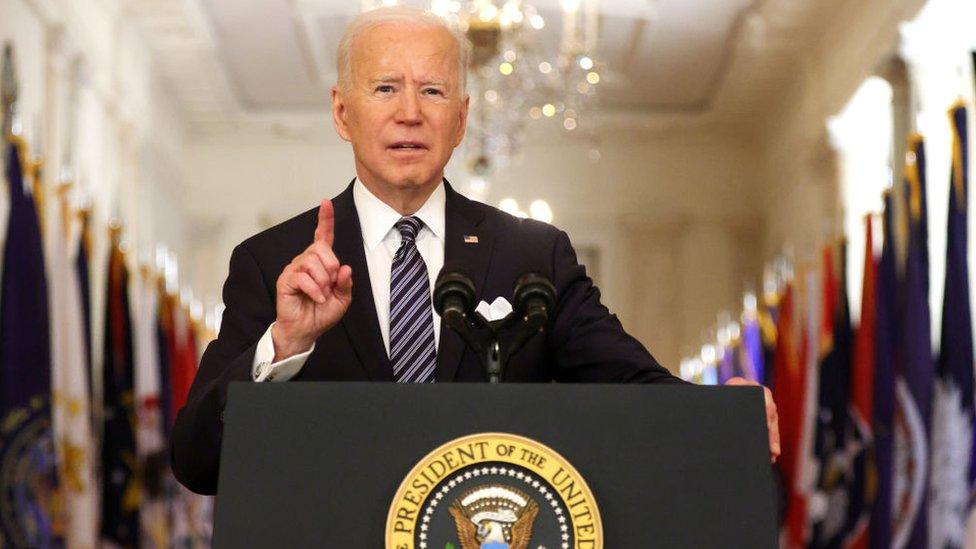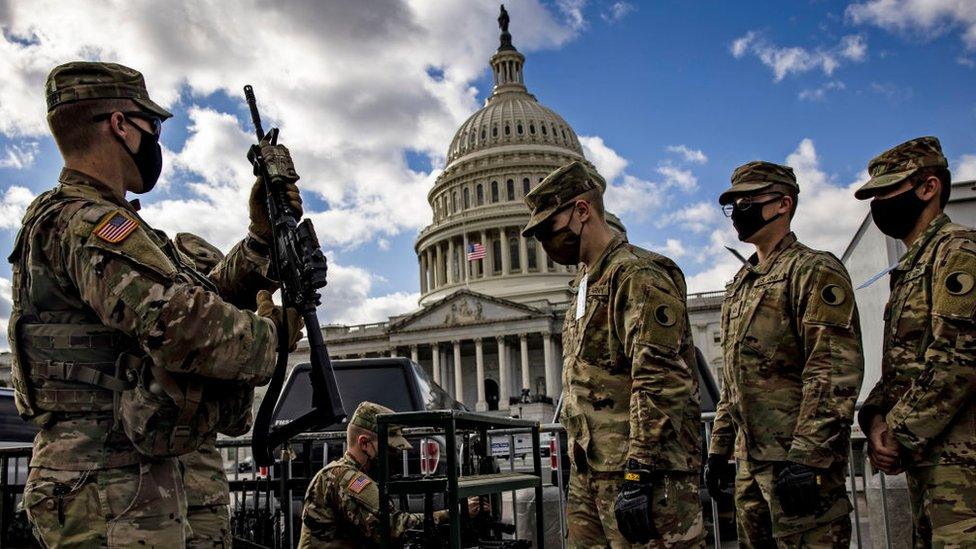Biden to sell child care and free university in speech to Congress
- Published

President Biden will try to build support for two massive spending packages
US President Joe Biden is expected to call for free pre-school and community college in his first speech to a joint session of Congress.
Speaking on the eve of his 100th day in office, the Democrat will call for the most sweeping revamp of US social benefits since the 1960s.
His plan includes $4tn (£2.9tn) of spending on education and family leave.
History will also be made as two women sit behind the president for the first time during a speech to Congress.
US Vice-President Kamala Harris and House of Representatives Speaker Nancy Pelosi will both wear masks at the rostrum during Wednesday night's primetime address.
The US president's State of the Union-style remarks will be followed by the traditional rebuttal speech from the opposing party - delivered on this occasion by Senator Tim Scott, a South Carolina Republican.
Mr Scott, a potential 2024 White House contender who is African American, is a leading voice in his party on race.
Allow X content?
This article contains content provided by X. We ask for your permission before anything is loaded, as they may be using cookies and other technologies. You may want to read X’s cookie policy, external and privacy policy, external before accepting. To view this content choose ‘accept and continue’.

What will happen at Biden's speech to Congress?
Mr Biden will speak at 21:00 EDT (02:00 BST on Thursday) from a US Capitol that is still ringed by security fencing and guarded by hundreds of National Guard troops following the storming of the complex on 6 January by pro-Trump protesters.
Ahead of his speech, he will meet congressional staff who were trapped in the building during the riot, the White House said.
Around 1,600 guests usually attend a president's address to a joint session of Congress. But this time only about 200 people will get invitations because of virus-prevention protocols.
Buoyed by solid approval ratings, Mr Biden will look to the tens of millions of Americans that the White House hopes will tune in from home.
The president will seek to build public support for two massive packages - the American Jobs Plan and the American Families Plan - which analysts project would entail the most far-reaching reform of the US social safety net since the 1960s.
The White House says both proposals if passed by Congress would be "fully paid for" by tax hikes on the richest Americans and corporations.

Security remains tight around the US Capitol
The American Families Plan, with a price tag of $1.8tn, aims to provide free pre-school for US children aged three to four, paid family leave and free community college, the White House said on Tuesday.
It would also extend until 2025 a child tax credit that was expanded during the pandemic, offering monthly payments to lower-income parents of around $300 per child. Democrats reportedly hope to establish these payments as a permanent government programme.
The White House has indicated the package would be funded by almost doubling the capital gains tax rate on incomes above $1 million to 39.6% and hiking the top income tax bracket for households earning more than $400,000 to the same level.
Reports of Biden plans for an increase in capital gains taxes sparked a stock market sell-off last week.

A transformational president?

We thought that Joe Biden - all 78 years of him - would be a transitional president. He would be there to lower the political temperature; try to heal a divided nation.
Take the absurd politics out of the response to Covid. Improve vaccine roll-out. Drain the poison from the body politic. But that aside, not do too much.
He appointed a largely technocratic cabinet, presumably to perform managerial functions. Maybe make the trains run on time a bit better, but not change all the rolling stock, let alone alter the gauge of the railway.
A fitting ambition for Amtrak Joe.
But maybe we've got that all wrong. Is it possible that far from being transitional, he's transformational?

What else will Biden say?
The president will also pitch his $2.3tn American Jobs Plan, which the White House unveiled last month.
Billed as an infrastructure package, it seeks to invest in public transit, rail, airports, water pipes, high-speed broadband, roads and bridges, veterans' hospitals, childcare centres and combating racial disparities.
The proposal also seeks to steer the US economy towards electric cars - which today make up barely 2% of vehicles of America's roads - and clean energy.
All the times the US spent big on infrastructure
It would be paid for by raising the corporate tax rate from 21% to 28% and other taxes on multinational corporations, says the White House.
During his speech, Mr Biden is also expected to address cultural flashpoints such as police reform, gun violence and the crisis at the US-Mexico border.
Last month he signed the American Rescue Plan, a $1.9tn coronavirus stimulus package that included direct cheques to most Americans.
How will Biden's speech be received by Republicans?
Senator Scott has been a leading voice in his party on race and has talked about times he has been racially profiled by police.
He has hinted that his rebuttal speech will not just be about ripping into the president's agenda.
"We face serious challenges on multiple fronts, but I am as confident as I have ever been in the promise and potential of America.
"I look forward to having an honest conversation with the American people and sharing Republicans' optimistic vision for expanding opportunity and empowering working families."
But among his colleagues in Congress there has been widespread opposition to the Biden agenda.
The US president's party narrowly controls the House and Senate for the first time in a decade, enabling Democrats to pass that relief bill without a single congressional vote from Republicans.
Top Republican Senator Mitch McConnell said on Tuesday: "President Biden ran as a moderate, but I'm hard pressed to think of anything at all that he's done so far that would indicate some degree of moderation."
In addition to three packages totalling around $6tn, Mr Biden last week also unveiled plans for a $1.5tn federal budget that would significantly expand spending on domestic programmes.